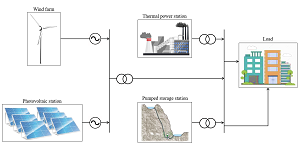Proactive Prevention Strategies for Grid Risk Scenarios Based on Pumped Storage Participation
DOI:
https://doi.org/10.46604/ijeti.2024.13635Keywords:
transmission line, electric betweenness, pumped storage, cascading tripping, uncertaintyAbstract
Given the increasing importance of cascading trip prevention, this study presents the pumped storage characteristics to cooperate with thermal units and further ensure the safety of grid operation. The proposed model comprises two phases: the first phase is the day-ahead decision-making phase, which synergistically optimizes thermal units and pumped storage to improve the flexibility of grid operation; the second phase is the intra-day adjustment phase considering the uncertainty of the wind-photovoltaic and transmission line failure outage to enhance the robustness. Furthermore, this model employs a column and constraint generation algorithm to solve the two-phase, three-layer optimization problem, thereby minimizing the adjustment cost under the riskiest scenarios. The experimental results show that adding pumped storage reduces the total system operating cost by 3.99%, the renewable energy abandonment rate to 0.65%, and the thermal power unit output standard deviation to 74.13 MW.
References
P. Ju, T. Y. Jiang, and Y. Huang, “Brief Discussion on the “Three-Self” Nature of the New Power System,” Proceedings of the CSEE, vol. 43, no.7, pp. 2598-2608, 2023. (In Chinese)
G. Yu, T. Hao, and J. X. Zhu, “Discussion on Action Strategies of China’s Carbon Peak and Carbon Neutrality,” Bulletin of Chinese Academy of Sciences, vol. 37, no. 4, pp. 423-434, 2022.
Z. Zhang and C. Kang, “Challenges and Prospects for Constructing the New-Type Power System towards a Carbon Neutrality Future,” Proceedings of the CSEE, vol. 42, no. 8, pp. 2806-2819, 2022. (In Chinese)
Y. Jiang, Z. Ren, Q. Li, Y. Guo, and Y. Xu, “An Accommodation Strategy for Renewable Energy in Distribution Network considering Coordinated Dispatching of Multi-Flexible Resources,” Transactions of China Electrotechnical Society, vol. 37, no. 7, pp. 1820-1835, 2022.
T. Li, W. Hu, J. Li, X. Han, and Z. Chen, “Intelligent Economic Dispatch for PV-PHS Integrated System: A Deep Reinforcement Learning-Based Approach,” Transactions of China Electrotechnical Society, vol. 35, no. 13, pp. 2757-2768, 2020.
Z. Cao, H. Chen, P. Hu, and L. Chen, “Day-ahead and Intraday Two-Stage Optimal Dispatch Model of a Thermal Power Plant Withenergy Storage and Taking into Account the Profit,” Power System Protection and Control, vol. 49, no. 12, pp. 106-113, 2021. (In Chinese)
Z. Zhang, W. Wang, X. Ma, X. Zhang, Y. Chu, K. Wang, et al., “Reserve of Power System Considering Renewable Energy Based on Risk Control,” Journal Power System Technology, vol. 44, no. 9, pp. 3375-3382, 2020. (In Chinese)
P. Li, D. Yu, M. Yang, and J. Wang, “Flexible Look-Ahead Dispatch Realized by Robust Optimization considering CVaR of Wind Power,” IEEE Transactions on Power Systems, vol. 33, no. 5, pp. 5330-5340, September 2018.
Y. Lin, Y. Ding, Y. Song, and C. Guo, “A Multi-State Model for Exploiting the Reserve Capability of Wind Power,” IEEE Transactions on Power Systems, vol. 33 no. 3, pp. 3358-3372, May 2018.
F. J. Heredia, M. D. Cuadrado, and C. Corchero, “On Optimal Participation in the Electricity Markets of Wind Power Plants with Battery Energy Storage Systems,” Computers & Operations Research, vol. 96, pp. 316-329, August 2018.
T. Aziz, N. A. Masood, S. R. Deeba, W. Tushar, and C. Yuen, “A Methodology to Prevent Cascading Contingencies Using BESS in A Renewable Integrated Microgrid,” International Journal of Electrical Power & Energy Systems, vol. 110, pp. 737-746, September 2019.
M. Z. Zakariya and J. Teh, “A Systematic Review on Cascading Failures Models in Renewable Power Systems with Dynamics Perspective and Protections Modeling,” Electric Power Systems Research, vol. 214, Part B, article no. 108928, January 2023.
H. Geramifar, M. Shahabi, and T. Barforoshi, “Coordination of Energy Storage Systems and DR Resources for Optimal Scheduling of Microgrids under Uncertainties,” IET Renewable Power Generation, vol. 11, no. 2, pp. 378-388, February 2017.
K. D. Pippi, T. A. Papadopoulos, and G. C. Kryonidis, “Impact Assessment Framework of PV-BES Systems to Active Distribution Networks,” IET Renewable Power Generation, vol. 16, no. 1, pp. 33-47, January 2022.
G. Huang, J. Wang, C. Chen, J. Qi, and C. Guo, “Integration of Preventive and Emergency Responses for Power Grid Resilience Enhancement,” IEEE Transactions on Power Systems, vol. 32, no. 6, pp. 4451-4463, November 2017.
Y. He, M. Shahidehpour, Z. Li, C. Guo, and B. Zhu, “Robust Constrained Operation of Integrated Electricity-Natural Gas System considering Distributed Natural Gas Storage,” IEEE Transactions on Sustainable Energy, vol. 9, no. 3, pp. 1061-1071, July 2018.
F. Lin, Z. Wang, G. Wang, and H. Xin, “Robust Reserve Scheduling Model of Electric Power System Considering WTG De-loading Capability,” Automation of Electric Power Systems, vol. 42, no. 19, pp. 64-70, 2018. (In Chinese)
K. Wang, X. Luo, R. Jia, and C. Zhou, “Short-Term Coordinated Scheduling of Wind-Pumped-Hydro-Thermal Power System with Multi-Energy Complementarities,” Journal Power System Technology, vol. 44, no. 10, pp. 3631-3640, 2020. (In Chinese)
Z. Chen, Y. Zhang, G. Ma, C. Guo, and J. Zhang, “Two-stage Day-Ahead and Intra-Day Robust Reserve Optimization Considering Demand Response,” Automation of Electric Power Systems, vol. 43, no. 24, pp. 67-76, 2019. (In Chinese)
H. Q. Deng, J. Luo, C. C. Li, P. Q. Li, and R. J. Zheng, “Preventive Control Strategy of Cascading Fault considering Safety and Economy,” Journal of Electrical and Computer Engineering, vol. 2021, article no. 4554236, 2021.

Published
How to Cite
Issue
Section
License
Copyright (c) 2024 Hui-Qing Deng, Hui Wu, Zhi-Wei Liang, Pang-Rong Zheng, Jun-Fu Shen

This work is licensed under a Creative Commons Attribution-NonCommercial 4.0 International License.
Copyright Notice
Submission of a manuscript implies: that the work described has not been published before that it is not under consideration for publication elsewhere; that if and when the manuscript is accepted for publication. Authors can retain copyright in their articles with no restrictions. Also, author can post the final, peer-reviewed manuscript version (postprint) to any repository or website.

Since Jan. 01, 2019, IJETI will publish new articles with Creative Commons Attribution Non-Commercial License, under Creative Commons Attribution Non-Commercial 4.0 International (CC BY-NC 4.0) License.
The Creative Commons Attribution Non-Commercial (CC-BY-NC) License permits use, distribution and reproduction in any medium, provided the original work is properly cited and is not used for commercial purposes.







.jpg)


